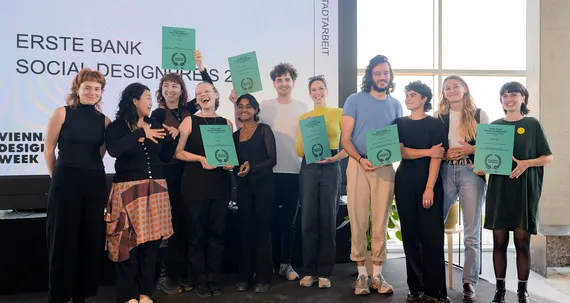
The Erste Bank Social Design Award will be awarded for the 10th time in 2024
This year, the City Work jury consisted of Lena Rücker (MA18 - Urban Development and Planning), Julia Habarda and Tobias Kauer (membran, winner of the Erste Bank Social Design Award 2023), Clemens Foschi (Caritas, Archdiocese of Vienna), Ruth Goubran (Erste Bank) as well as Hanna Facchinelli and Gabriel Roland (VIENNA DESIGN WEEK).
City Work Projects 2024 will take place in the centre of the third district, where well-frequented locations and newly discovered corners will be explored by means of travelling kitchens and urban legends performances. In addition to the locations in the focus district of Landstraße, the format also invites visitors to a remarkable neighbourhood around Hernalser Elterleinplatz, which illustrates the microclimatic potential of Vienna's inner courtyards. In very different ways, the interventions ‘Kiosk T//Waste’, ‘An Urban Legend to Be’ and ‘Wiener Klimahöfe’ deal with the social challenges of urban coexistence, analyse urban spaces and - in the best case scenario - improve coexistence in the city through the joint efforts of designers and the festival public.
All three projects will be realised at VIENNA DESIGN WEEK 2024 and are open to the public free of charge.
The 2024 Winning Projects
‘Wiener Klimahöfe’ - Microclimates as an Opportunity for the City
With the ‘Wiener Klimahöfe’ project, Future Problems Architecture Studio is demonstrating the microclimatic potential of the city's existing inner courtyards. To mark the VIENNA DESIGN WEEK, Future Problems Architecture Studio is inviting visitors to explore the courtyards between Geblergasse, Hernalser Hauptstraße, Weißgasse and Ortliebgasse in the form of guided walks, talks and workshops. The topics range from urban density, unsealing and greening to the diversity of uses in communal spaces.
The Future Problems Architecture Studio, consisting of Julian Raffetseder and Klara Jörg, deals with questions of coexistence and combines strategies of circular building with architectural measures.
‘An Urban Legend to Be’ - New perspectives on the city
‘An Urban Legend to Be’ is an artistic research project by klub für echtes und erdachtes (klee). klee playfully and performatively explores new ways of urban and spatial exploration as well as the potential of fiction as a connection between realities, people and temporalities. As part of the Stadtarbeit format, the klee team invites you to become an active part of its methods and create new narratives together. With four different performative urban explorations and story creation workshops in the Landstraße focus district, the project offers opportunities to experience and rethink urban myths together.
klee, the club for the real and the imagined, works at the interface of urban research and interventions in public space. In a humorous way and with a self-critical approach, Luca Hierzenberger, Hannah Horn, Lukas Kobel and Hannah Leimberger, students at the University of Applied Arts Vienna, encourage participation through irritation and enter into an exchange with what they have found.
‘Kiosk T//Waste’ - Centre of Life: Kitchen
The nomadic intervention ‘Kiosk T//Waste’ uses a mobile catering unit to process salvaged ingredients from local businesses into vegetarian dishes and thus raise awareness of the issue of food waste in commercial kitchens. The ‘Kiosk T//Waste’ project invites the participating public to redefine the concept of waste at various locations in the focus district of Landstraße and neighbouring Favoriten - from WIEN MITTE - The Mall to the Botanical Gardens of the University of Vienna and the Kulturhaus Brotfabrik. The accompanying events range from talks to community cooking organised by Caritas, showing how menus can be prepared according to the leaf-to-root principle - i.e. without residues and waste.
The T//Waste collective, based in the Netherlands and Austria, works at the interface of social design, sustainable food systems and community building. The work of the six-member team is based on the conviction that food is a suitable tool for engaging with cultures, social groups and languages.